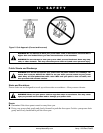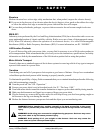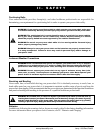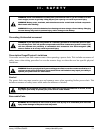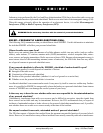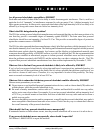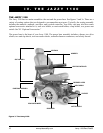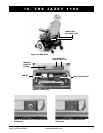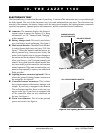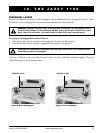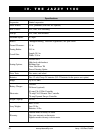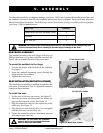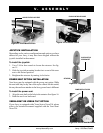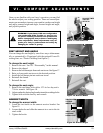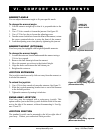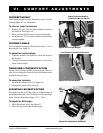
18 www.pridemobility.com Jazzy 1100/RevJ/Feb03
IV. THE JAZZY 1100
STANDARD HEADLIGHT/
TAILLIGHT CONNECTOR
Figure 7. Main Circuit Breaker
MAIN CIRCUIT BREAKER
Figure 8. Full Lighting Harness Connector
FULL LIGHTING HARNESS CONNECTOR
ELECTRONICS TRAY
The electronics tray is located on the rear of your Jazzy. A section of the electronics tray is exposed through
the body shroud. The rest of the electronics tray is located underneath the rear door. The electronics tray
consists of the ammeter, the battery charger cord, the main circuit breaker, the lighting harness connectors
(optional equipment), optional power seat connectors, and the controller harness connectors.
n Ammeter: The ammeter displays the chargers
current output in amps. See figure 6. For more
information, see IX. Batteries and Charging
in this manual.
n Battery charger cord: This cord is used when-
ever your battery needs recharging. See figure 4.
n Main circuit breaker: The main circuit breaker
is a safety feature built into your Jazzy 1100. See
figure 7. When the batteries and the motors are
heavily strained (e.g., from excessive loads), the
main circuit breaker trips to prevent damage to
the motors and the electronics. If the circuit trips,
allow your Jazzy to rest for approximately one
minute. Next, push down the circuit breaker but-
ton, turn on the joystick controller, and continue
normal operation. If the main circuit breaker con-
tinues to trip repeatedly, contact your authorized
Pride provider.
n Lighting harness connector (optional): This is
where the optional lighting harness connects to
the controller. See figure 8.
n Controller harness connectors: This is where
the joystick connects to the motors, batteries, and
charger. If your Jazzy is equipped with a Remote
Plus or Europa controller, there is only one con-
nector on the tray. If your Jazzy is equipped with
a Pilot controller, there are two connectors on
the tray. See figure 4.
n Power seat connector: This is for the optional
power seat switch. See figure 4.



